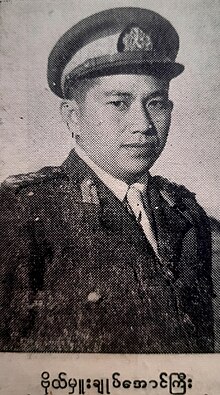Aung Gyi
| Aung Gyi | |
|---|---|
| ေအာင္ႀကီး | |
 |
|
| Founder of the Union National Democracy Party | |
|
Assumed office 16 December 1988 |
|
| Chairman of the National League for Democracy | |
|
In office 27 September 1988 – 3 December 1988 |
|
| Member of the Revolutionary Council of Burma | |
|
In office 2 March 1962 – 8 February 1963 Serving with Ba Nyein, Tin Pe |
|
| Personal details | |
| Born | 16 February 1919 Paungde, British Burma |
| Died | 25 October 2012 (aged 93) Mayangone Township, Yangon, Myanmar |
| Cause of death | Heart failure |
| Nationality | Burmese |
| Spouse(s) | Mu Mu Thein |
| Children | 4 children |
| Occupation | Politician (1963–2012); Deputy Commander-in-Chief (until 1963) |
| Military service | |
| Allegiance |
|
| Service/branch | Burmese Army |
| Years of service | 1948–1963 |
| Rank | Brigadier General |
| Unit | 4th Burma Rifles |
| Commands | Western Regional Military Command |
| Battles/wars | Rohingya insurgency in Western Myanmar |
Brigadier General Aung Gyi (Burmese: အောင်ကြီး [ʔàʊɴ dʑí]; 16 February 1919 – 25 October 2012) was a Burmese politician and a member of General Ne Win's 4th Burma Rifles rising to Brigadier General. He was born to a Burmese Chinese family in Paungde, British Burma in 1919. He played a role in the caretaker government of 1958-60 led by Ne Win. Aung Gyi was number two in the Union Revolutionary Council set up after the 1962 coup, serving as vice-chief of staff and Minister of Trade and Industry until he was forced to resign on 8 February 1963 because of disagreements over economic policy with Ba Nyein and Tin Pe. He was once known as Ne Win's heir apparent. In his memoirs, "Saturday's Son", published in 1974, U Nu, then Prime Minister of Myanmar, claimed that his handover of power to the caretaker government was not voluntary but that a group of Army Officers led by Brigadier Aung Gyi and Brigadier Maung Maung threatened him with a "straight military coup" should he refuse to handover power to Ne Win. The suggestion that this coup was mainly led by Brigadier Aung Gyi and Maung Maung was supported Col Hla Maw, former commanding officer of 11th Brigade.
Aung Gyi's role in suppressing the anti-government student protests in 1962 is not clear. In his resignation speech of 23 July 1988, Ne Win blamed Aung Gyi as "the real culprit" in the destruction of the Rangoon University Student Union Building on 8 July 1962. Aung Gyi was ousted in 1963, when he criticized the Council's economic policies, and for statements made in Japan about the cause of the 1962 coup. He was imprisoned in 1965-68, and again in 1973-74. However, Aung Gyi remained loyal to the Tatmadaw (Armed Forces), and his connection with Ne Win remained intact despite his later blunt criticism of the government.
...
Wikipedia
